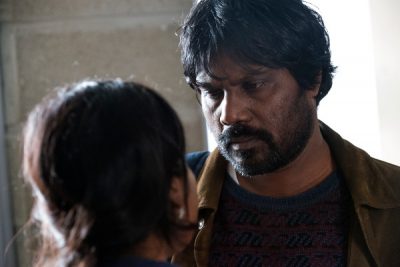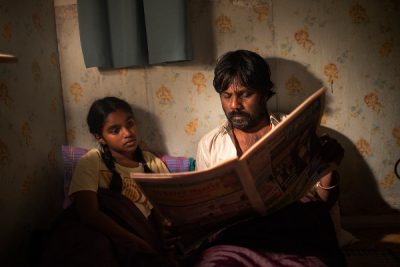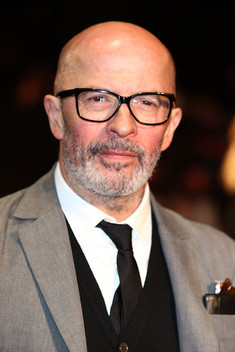We are very excited to open Jacques Audiard’s DHEEPAN this Friday at the Royal and May 20th at the Playhouse 7 and Town Center 5. Winner of the Palme d’Or at last year’s Cannes Film Festival, Audiard’s (The Beat that My Heart Skipped, Rust and Bone, A Prophet) latest is a gripping, human, and timely tale of survival in which three Sri Lankan refugees pose as a family to flee their war-ravaged homeland for France, only to find themselves embroiled in violence in the Parisian suburbs.
Slate just posted this interview with M. Audiard and his lead actor, Jesuthasan Antonythasan:
Slate’s Aisha Harris: Jacques, what drew you to telling this story?
Jacques Audiard: It goes back five years ago. At the end of shooting A Prophet … I wanted to do a remake of Sam Peckinpah’s Straw Dogs with immigrants in a housing project. So I gave up on the idea of Straw Dogs—I didn’t totally give it up, but put it on the side—and it became another story … The starting point—the spark of the movie—is this idea of the fake family—this concept of the fake family. And, slowly, love [enters] the story. At the end, there was a bit of everything: There was a bit of Straw Dogs; there was a bit of a love story, a bit of the fake family.
And Shoba, you were once part of the Tamil Tigers [Liberation Tigers of Tamil Eelam]. How much of your story wound up in the movie, and how much did you collaborate on the script?
Jesuthasan Antonythasan: So, there are a lot of similarities between the Dheepan character and myself. For example, we were in the LTTE, we are immigrants, and we came out of the country on fake passports. That’s the 50 percent similarity, I would say. The remaining 50 percent, where we are not alike—that is in the way we responded to the same situations. The way he reacted to the pressures and things that he faced is very different from how I would’ve reacted to them.

That is a big part of the story: Dheepan having been a former soldier and trying to escape that, but then there’s also the struggle of being in a completely different war zone in a foreign country with gangs. What are the main differences between how you responded and how Dheepan responded to being in that kind of environment?
Antonythasan: So, when I left Sri Lanka and came to France, I was 20 years old. This character, when he leaves, he’s in his 40s. I left at a time when the issues in Sri Lanka were actually smaller and on the verge of becoming a lot worse, but this character comes when they are at their peak. And so he comes at a time when he’s basically formed his thoughts, and he’s come without any other options. I came at age 20 with my own ideologies. I came to France and got involved in politics on my own—like Marxist organizations—and continued to learn and educate myself. But he comes at a time where everything’s sort of fully formed, and that’s his reaction, because he’s kind of set in his ways.

The war ended, technically, in 2009. Have you been back since? Do you have any desire to go back?
Antonythasan: Legally, I cannot visit Sri Lanka at the moment, because I’m an illegal immigrant to France, so I don’t have the documents to be able to go back and visit. Also, the situation is such that I cannot go there and freely speak or freely write. So, I don’t want to go there until I can do that.
In the scene where the commander comes and tries to bring you back, is that something that happened to you, or have you ever felt that pressure from outside forces to go back?
Antonythasan: It didn’t happen to me directly, because at the time that I left the country it was very different circumstances.
This was in the ’80s, correct?
Antonythasan: ’86. But, in 2009, when the war technically ended over there and the Tigers were, more or less, complete in Sri Lanka, it did happen all over the world. So: Europe, Canada, the States, where that kind of situation—of people coming and trying to rebuild the Tigers from outside of Sri Lanka—was very, very realistic.
What was it like for you to reenact things that happened when you were younger? Did it affect you at all?
Antonythasan: I left the country almost 25 years ago. So, when I was making this film, it’s not as if they came flooding back after 25 years—I’ve been remembering them, re-living them, and going through them every single day for all those years.
As you mentioned, Jacques, Dheepan is also kind of a love story. And that love is very much built around that fake family—trying to learn to love this woman who’s supposed to be your wife and learn to love this child who’s supposed to be your daughter. What did you hope to convey about those characters within the relationships between the three of them?
Audiard: I’m not sure that the function of movies is to convey a message. It is just to show images. [The theme that I was interested in] is: How do you change your life? How many chances do you have to change your life? One? Two? Seven? What does it cost? What does it cost to leave your old life behind, and what does it cost to start a new one? He really believes that we deserve several lives, but the second life is always more expensive than the first one. The first one has been given to you; the second one, you have to create it. That’s your own project.

This movie is very timely right now, considering everything that’s going on with the Northern African and Middle Eastern refugees who are seeking asylum. In light of the news this week about France taking in, I think, 25,000 refugees, how do you feel about that? And do you think that nations that can do it should be opening their borders?
Antonythasan: In my opinion, these Western countries that have the ability to take in refugees have the duty to take them in. Because what happened in Sri Lanka was not just the result of just the Sri Lankan government—it was the result of many international governments feeding in and causing that war and the genocide. So they have the duty to take in those who are affected or who are victims of that war. So just like things happening in Syria and other countries right now—that is a result of a lot of other governments having a hand in them, so they have a duty to clean up what they started.
How about you, Jacques?
Audiard: I totally agree with what Shoba said … I think that’s just the beginning. What we are seeing today is just small images of what’s going to happen in the future. And we are very late to react, especially in European countries. If you are small in Europe—you have a small country—they think they are gonna continue their own lives by themselves—national identity, so on and so forth … It’s garbage. It is going to explode. It is going to explode. The world of tomorrow will be like that—that’s gonna be our culture: total worldwide migrant movement.
Antonythasan: This news that France—or London and France—for example, is taking 25,000 immigrants, or London taking so many thousand—they’re making such a big deal out of that, but you don’t realize that countries like India and Pakistan have been taking in refugees for years, and in way larger amounts. And Pakistan is one of the countries that welcomed the most refugees in general.
To conclude, I’d like to pivot to that final scene, when Dheepan is ascending upon the gang house, which is much darker in terms of the way it’s shot, compared to the rest of the movie. It sort of reminded me, in a weird way, of the final scene in Taxi Driver—was that an influence at all?
Audiard: It came to my mind, absolutely. In economic terms, I wanted to do a low-tech shot, so that’s what was in my mind, yes … And actually, I wanted to do an overshot from the top, too, but I didn’t have the means to do it, so I gave up on the idea. But the idea was there.
This interview has been edited and condensed for clarity.
